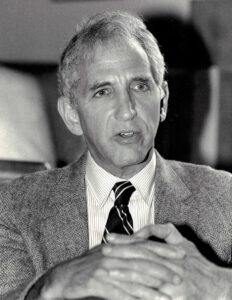The bureaucracy keeps a wide range of information secret that does not, either on its face or in retrospect, require secrecy from external powers. Such secrets are usually used in the service of the administration’s domestic political interests.
In the work we did, you could not have the confidence of powerful men and be trusted with their confidences if there was any prospect that you would challenge their policies in public in any forum at all. That was the unbreakable rule of the executive branch. It was the sacred code of the insider, both the men of power and those, like me, privileged to advise and help them. I knew that as well as anyone because I had lived by that code for the last decade; it was in my skin.
Yet I was, it seems, in the process of shedding that skin. Lying to the public, about anything, but above all on issues of life and death, war and peace, was a serious matter. It wasn’t something you could shift responsibility for. I decided I wasn’t going to do it anymore.
It occurred to me that what I had in my safe at RAND was 7,000 pages of documentary evidence of lying, by four presidents and their administrations over twenty-three years, to conceal plans and actions of mass murder. I decided I would stop concealing it and I would find a way to get it out.
Even though this would involve breaking the promises on secret-keeping that I had made earlier to various government agencies and to the RAND Corporation, I was confident that revealing the contents of the Pentagon Papers on the Vietnam War to the Senate and press was the right thing to do under the circumstances. It was the only way—I had considered many other ways and tried most of them—to inform Congress and the American public of information that was still being wrongfully withheld from them. This information was vital to Constitutional processes of decision-making on an ongoing war in which tens of thousands of Americans, and many more Vietnamese, had, in effect, been lied to death.
Yes, leaks can “embarrass” us domestically or in our relations to other nations. But in some cases the public does need to know just what is most embarrassing—such as the fact that the United States government secretly supports, allies with, and even creates dictatorial and corrupt regimes.
—Daniel Ellsberg

